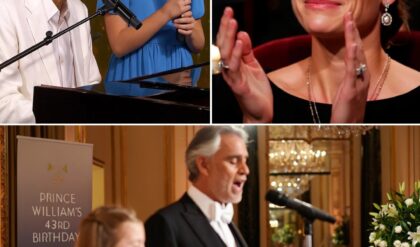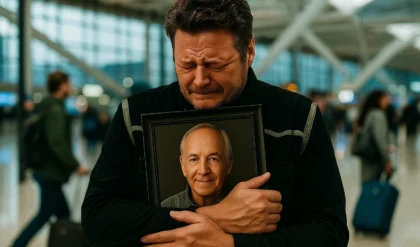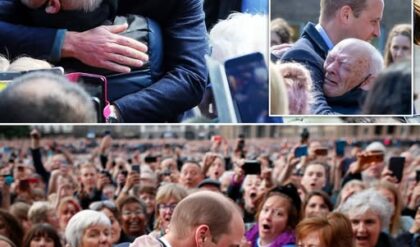In the electrifying roar of Rio de Janeiro’s Maracanã Stadium—where the ghosts of Pelé’s triumphs and Maradona’s magic still linger in the concrete arches—a different kind of legend took the pitch on November 3, 2025. Prince William, the 43-year-old Prince of Wales, traded his Kensington Palace diplomacy for a pair of eco-friendly trainers and a football, stepping into a spotlight that blended royal poise with playground passion. What began as a scripted community kickabout during his Earthshot Prize tour to Brazil blossomed into a moment of unbridled joy and quiet heroism. With a flawless penalty that slipped past a wide-eyed young goalkeeper and into the net, William didn’t just score a goal; he netted hearts across a nation. But the real thunderclap came moments later, as the crowd’s chants of “William! William!” swelled like a samba wave. Seizing the microphone amid the echoes, the prince announced a personal $50,000 donation to Terra Football Club, a grassroots initiative empowering underprivileged kids to weave environmental activism into their love for the beautiful game. “This isn’t about one kick,” he said, his voice steady over the din, “it’s about giving every child here the chance to dream big—on the pitch and off it.” As high-fives rained down from beaming youngsters and Brazil’s football icon Cafu clapped him on the back, William’s gesture transcended the turf, transforming a friendly match into a beacon of hope for Rio’s favelas. For a prince often shadowed by duty’s weight, it was perhaps his most meaningful goal yet—a strike for the future, laced with compassion.
The Maracanã, that colossal cauldron of 78,000 souls where Brazil’s 1950 World Cup heartbreak birthed a nation’s unbreakable spirit, has hosted emperors of the sport: Garrincha’s dribbles, Ronaldo’s headers, Neymar’s flair. On this balmy Monday afternoon, however, its hallowed grass welcomed a different sovereign—one whose realm spans palaces and pitches alike. William’s arrival in Brazil marked his first official foray into Latin America, a whirlwind five-day odyssey timed to coincide with the Earthshot Prize awards on November 5 and the looming COP30 climate summit. Jet-lagged but beaming, he touched down in Rio the previous evening, his schedule a tapestry of environmental advocacy: from biodiversity briefings on Sugarloaf Mountain’s mist-shrouded peaks to United for Wildlife summits tackling poaching’s plunder. Yet, amid the policy papers and podium speeches, the prince carved out space for what he calls “the human heart of change”—engagements that ground global goals in local grit. The Maracanã visit, organized in partnership with Terra FC, embodied this ethos: a fusion of football’s universal language and the urgent dialect of sustainability, drawing 50 young changemakers from Rio’s sprawling favelas to learn how the sport they adore can safeguard the planet they inherit.
Terra Football Club isn’t your glossy Premier League academy; it’s a scrappy symphony of social justice, born in 2018 from the vision of co-founders Ricardo Calçado and a cadre of former favela players turned activists. Operating in the shadow of Rio’s iconic Christ the Redeemer—where corrugated tin roofs climb like vines up Corcovado’s flanks—Terra channels the energy of the jogo bonito into eco-education. Picture this: kids from Complexo do Alemão, once a no-go zone scarred by gang wars, now dribbling through drills that double as lessons on deforestation. Calçado, a wiry 38-year-old with tattoos mapping his journey from street footballer to NGO navigator, recalls the spark: “We saw how Pelé’s legacy inspired resilience here. Why not use that fire to fight climate fires—reforestation drives, plastic-free pitches, workshops on ocean health?” Today, Terra touches 5,000 lives annually, partnering with clubs like Flamengo and NGOs to host “green goals” tournaments. Their mantra? “Jogue pelo Planeta”—play for the planet. For these children, many orphaned by violence or orphaned by poverty, football isn’t escape; it’s empowerment—a ball at their feet, a future in their hands.
William’s convoy snaked through Rio’s labyrinthine streets that morning, past murals of samba queens and market stalls hawking fresh açaí bowls, the humid air thick with anticipation. Dressed in a crisp white polo that hugged his athletic frame—honed by Aston Villa matchdays and Norfolk runs—and those sustainable Mr. Marvis trainers (crafted from recycled ocean plastics, a subtle nod to his eco-mission), he exuded the easy charisma that has endeared him to crowds from Cardiff to Canberra. Greeted at the stadium’s VIP entrance by Mayor Eduardo Paes and a phalanx of dignitaries, William wasted no time on small talk. “Show me the magic,” he grinned, shaking hands with Cafu—Marcos Evangelista de Morais, the 55-year-old captain of Brazil’s 2002 World Cup triumph, whose two-winged play revolutionized the game. Cafu, with his salt-and-pepper beard and infectious laugh, had been William’s pitch partner for the day, a bridge between Windsor and the World Cup. “Your Highness, prepare to samba,” Cafu teased, as they descended to the field where 50 kids, aged 8 to 14, awaited in mismatched kits—Terra’s signature green jerseys splashed with leaf motifs.
The event kicked off with a whirlwind of warm-ups, the Maracanã’s vast emptiness amplifying every giggle and grunt. William dove in unreservedly, lacing up for passing drills where he bantered with the boys about Premier League loyalties—”Arsenal? Nah, Villa’s got the grit!”—and shared sly tips on feints. But it was the girls’ session that stole his heart. A cluster of 10-year-olds, fierce and focused, balanced water cups on their heads while dribbling— a Terra staple to hone poise and prevent spills, mirroring conservation’s delicate dance. One pint-sized phenom, Sofia Mendes, 11, from Vidigal favela, nailed a nutmeg on the prince, her eyes sparkling with mischief. “Like my daughter Charlotte,” William chuckled, revealing a rare paternal glimpse. Back in Kensington, 10-year-old Charlotte—football-mad since toddlerhood, her room a shrine to Lionesses posters—is reportedly a daily pitch pest with brothers George and Louis. Insiders whisper she’ll devour the footage: “Papa’s goal for the girls? Pure gold.” As the session peaked, Cafu orchestrated a three-a-side scrimmage, pitting William’s squad against his—adults versus kids, with the prince playing wing to shield the little ones. Laughter echoed off the stands; a misplaced pass from William drew mock boos, swiftly turned to cheers with his recovery sprint.
Then, the crescendo: the penalty shootout. Under the stadium’s floodlights—early dusk painting the sky in mango and mauve—20 kids lined up, nerves jangling like loose change. William, slotted last, drew the straw for the finale against Pedro Enrique, a lanky 14-year-old from Rocinha whose saves had already earned him Terra’s “Guardian of the Goal” moniker. Pedro, with his mop of curls and goalkeeper gloves too big for his hands, bounced on his toes, whispering mantras in Portuguese. The crowd— a mix of locals, volunteers, and a smattering of media—hushed as William placed the ball on the spot, 12 yards from glory. Chants built: “Wil-li-am! Wil-li-am!” He glanced at Pedro, flashed a conspiratorial wink—”Give it your all, mate”—then struck. The ball arced low and true, kissing the net’s corner as Pedro’s dive grazed air. Bedlam erupted: hugs from the team, high-fives cascading like confetti, Cafu hoisting William on his shoulders in a victory lap that blurred prince and player. Pedro, grinning through mock defeat, admitted later: “Nervous? Terrified. But thrilled—the most famous penalty ever. He made me better.”
Yet, amid the euphoria, William’s mind turned outward. As the echoes faded and the kids gathered in a semi-circle on the turf—sweaty, exhilarated, eyes wide with wonder—he stepped to the mic. “What a day,” he began, his tone shifting from jubilant to earnest. “Football unites us—Brazil knows that better than anyone. But here at Terra, it’s doing more: teaching these incredible young people to protect our planet, one kick at a time. To honor that, I’m donating $50,000 personally to support your projects—new kits, training grounds, eco-workshops. Because every goal starts with a dream.” Gasps rippled; Calçado, wiping tears, enveloped him in a bear hug. “Pure class,” the co-founder beamed afterward. “Not fame—giving back. Our kids see a leader who listens.” The donation, wired via the Earthshot Foundation’s channels, targets Terra’s “Green Goals” initiative: solar-powered pitches in underserved favelas, scholarships blending coaching with climate science. For Pedro and Sofia, it’s tangible: new gloves, a pathway to academies, a whisper that their world matters.
William’s Brazil jaunt isn’t his first dance with the global stage, but it pulses with personal resonance. As patron of England’s Football Association and a vocal advocate for mental health through Heads Together, he’s long wielded sport as a salve—hosting Grenada kids for penalty practice, cheering England’s Euros runs from the stands. Fatherhood amplifies this: George, 12, a budding tactician; Charlotte, the “football fiend” who once upended a Christmas tree in goalie gloves; Louis, 7, the wildcard winger. “Charlotte will be over the moon,” a palace aide confided. “She idolizes Marta—now, her dad’s channeling that spirit.” The visit dovetails with Earthshot’s ethos, William’s brainchild since 2020: £50 million prizes for green innovators, from mangrove guardians in Senegal to plastic-eaters in Singapore. In Rio, finalists include a Brazilian AI firm replanting Amazon clearings and a UK startup filtering microplastics from laundry—laudable leaps, but William’s pitch-side pledge grounds them in grass-roots grit.
For Terra’s charges, the ripple is profound. In favelas where gunfire once drowned out goal horns, these kids now map plastic pollution with GPS apps during halftime. Sofia dreams of captaining Brazil’s women’s team while leading reforestation squads; Pedro eyes pro trials, but vows to coach Terra’s next wave. “The prince didn’t just score,” Sofia said, clutching a signed ball. “He showed us we score too.” Calçado, reflecting over caipirinhas post-event, called it “transformational.” “William asked about our challenges—funding droughts, gang pull. He listened, then acted. That’s royalty redefined.”
As the sun dipped behind Copacabana’s curves—where William later ditched shoes for barefoot volleyball, spiking balls with locals amid sunset cheers—the Maracanã moment lingered like afterglow. Critics might scoff at “soft power soccer,” but for a prince navigating monarchy’s minefield—Harry’s rift, Charles’s health, public polls teetering on relevance—it’s savvy symbolism. In Brazil, land of carnivals and comebacks, William’s goal wasn’t conquest; it was connection. A penalty for the planet, a donation for the dreamers. Back in the UK, Charlotte’s bedtime tales will swell with pride: “Papa’s the hero who scored for us all.” And in Rio’s resilient heart, a new chant rises—not just “William,” but “Hope.” For the boy who once dreamed of flying helicopters, not crowns, this was his finest flight: a strike that bent the net of possibility, one child at a time.





